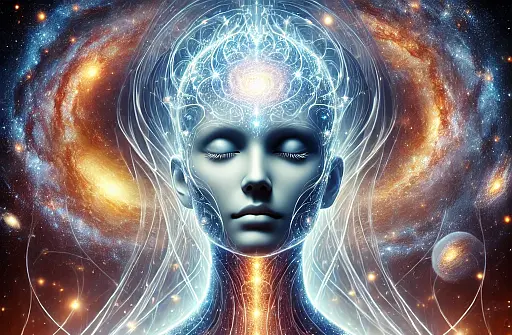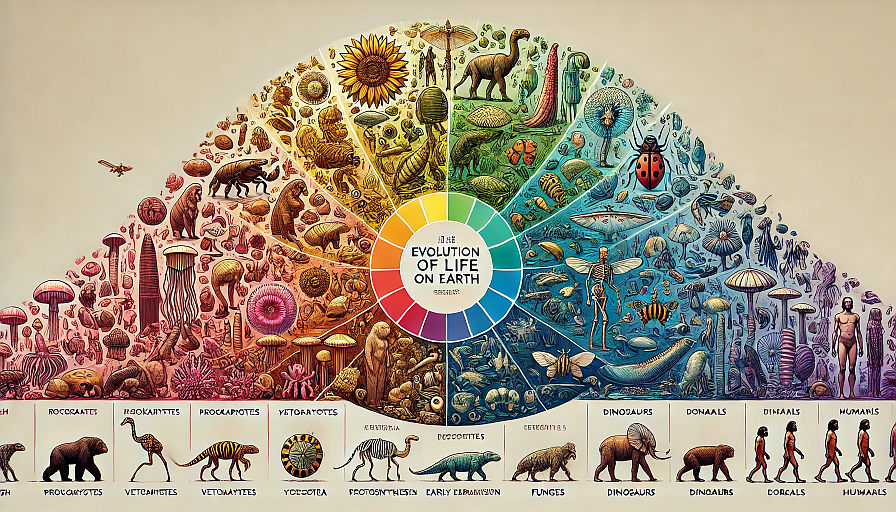
Cosmic Consciousness
According to data from the Pew Research Center and other demographic studies, approximately 84% of the global population identifies with a religious group.[ref] This includes adherents of major world religions such as Christianity, Islam, Hinduism, Buddhism, Judaism, and various folk religions, as well as smaller religions and spiritual traditions.
Thus, it is reasonable to conclude that most of humanity accepts the existence of supermaterial realities, whether consciously or as part of their cultural and spiritual heritage. However, on the flip side of this data is the fact that 1.3 billion people do not believe not only God does not exist, but that matter is the basis for all reality. This is called materialism or pure rationalism.
What is ironic about this situation is that he very fact that a materialist can deny the existence of supermaterial realities in and of itself demonstrates the presence, and indicates the working, of spirit synthesis and cosmic consciousness in his human mind. How is that so? Well, first The denial of supermaterial realities requires the capacity for abstract reasoning, self-reflection, and philosophical inquiry—qualities that transcend mere animalistic or material instincts. Such mental faculties are hallmarks of cosmic consciousness, which allows individuals to contemplate metaphysical concepts, whether they accept or reject them. The act of denial itself is not just a material response; it involves a complex engagement with ideas that lie beyond sensory perception, reflecting the human mind's intrinsic ability to grapple with the intangible.
Curiously, a materialist’s choice to deny supermaterial realities reflects a profound exercise of free will and intellectual autonomy. This ability to choose beliefs, irrespective of empirical evidence, implies the operation of an internal cognitive framework that goes beyond mere material causation, suggesting a synthesis between a supermaterial spirit influence (cosmic mind & spirit) and the human mind. The very act of denying supermaterial realities often arises from a deep-seated conflict between observed reality and inner intuitions or inklings of something more profound. This conflict can only occur if there is an inherent awareness of something beyond the physical, even if it is consciously rejected. The mind's struggle with these concepts — choosing to affirm or deny them — indicates an engagement with a consciousness of the material cosmos and immaterial (unseen/unperceived) realities, as it reflects an ongoing synthesis of other-than-material (spiritual) perception and intellectual discernment.
Let's go a bit deeper with this analysis. Doubt and skepticism are functions of an advanced consciousness that questions and critically evaluates the nature of reality. Such questioning is not purely a material process but an aspect of a mind that is inherently connected to higher cognitive and supermaterial capacities. The fact that a person can conceptualize, argue against, or even question the existence of supermaterial realities is in itself a demonstration of the mind’s ability to reach beyond materialistic boundaries, driven by the deeper and abstract cosmic elements within the mind's range of conceiving.
The Fifth Epochal Revelation provides a cosmic and spiritual model that is hard to be skeptical about. The following passage by a Divine Counselor of Uversa explains how humans are repletely "wired" for spirit communications:
There are many untrammeled lines of spiritual force and sources of supermaterial power linking the people of Urantia directly with the Deities of Paradise. There exist the connection of the Thought Adjusters direct with the Universal Father, the widespread influence of the spiritual-gravity urge of the Eternal Son, and the spiritual presence of the Conjoint Creator. 9:2.3 (100.5)
The Urantia Book presents a holistic cosmic model that intricately weaves matter, mind, and spirit in an intricately structured, revolving universe of universes. At the core of this model are the seven superuniverses, revolving around the central and divine universe of Havona. Each superuniverse is a vast creation, teeming with galaxies, stars, and countless planetary systems. The seven superuniverses are not merely physical manifestations; they each are believed to possess distinctive spiritual characteristics and administrative functions within what is described as the grand universe.
At the heart of these superuniverses lies the concept of the Seven Absolutes of Infinity. These Absolutes are the unifying framework that cohesively integrates all aspects of reality – the existential, experiential, and associative. They include the First Source and Center (or God), the Second Source and Center (the Eternal Son), the Third Source and Center (the Infinite Spirit), the Isle of Paradise, the Deity Absolute, the Unqualified Absolute, and the Universal Absolute. These entities/forces are the foundational elements of all existence, regulating and harmonizing the interrelationships of matter, mind, and spirit.

To elaborate on the mindal framework, The Urantia Book introduces the concept of the adjutant mind spirits and the cosmic mind. The seven adjutant mind spirits are the functional aids of the local universe Mother Spirit, aiding in the development of creature intellect. They represent different facets of mindal activity in increasing complex functionality. The revelation catagorizes these as: intuition, understanding, courage, knowledge, counsel, worship, and wisdom. On the other hand, the cosmic mind is a manifestation of the Third Source and Center and encompasses a universal, absolute mind reality. It governs the interaction of matter, mind, and spirit and is integral to the divine plans and purposes. The Holy Spirit is the human's connection to cosmic mind.
Thought Adjusters and personality are also vital in The Urantia Book's cosmology. Thought Adjusters are fragments of the divine First Source and Center that reside within each individual and guide their spiritual growth. They strive to adjust the human mind toward divine perfection. Personality, as per The Urantia Book, is an unexplained mystery gifted by the First Source and Center, which imparts uniqueness and dignity to every individual, rendering each one a potential spiritual receptacle and a moral agent.
Together, these components construct a new mental framework that is intended to guide moral and ethical discernment. By considering the divine and cosmic perspective, individuals can navigate the complexities and paradoxes of moral and ethical dilemmas. They can appreciate the intricate interplay of the physical and the spiritual and the importance of their personal decisions within the cosmic context. The Urantia Book's model presents an interwoven reality of matter, mind, and spirit, leading to a greater appreciation of the universe's profound complexity and our place within it.